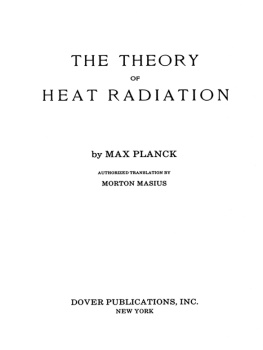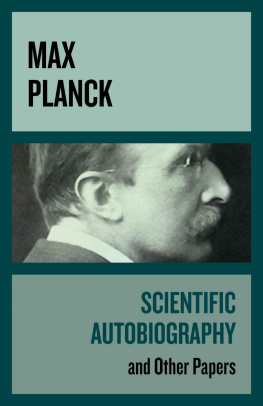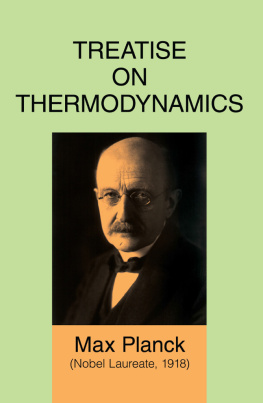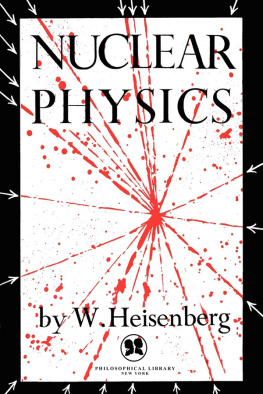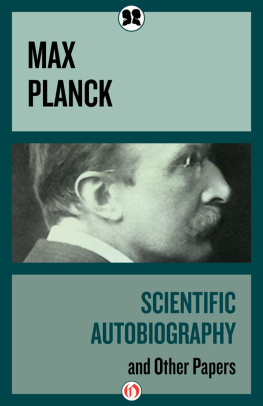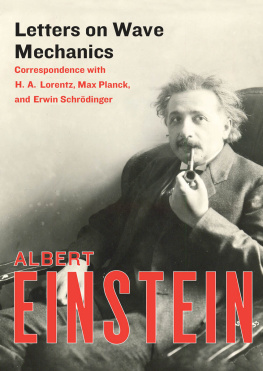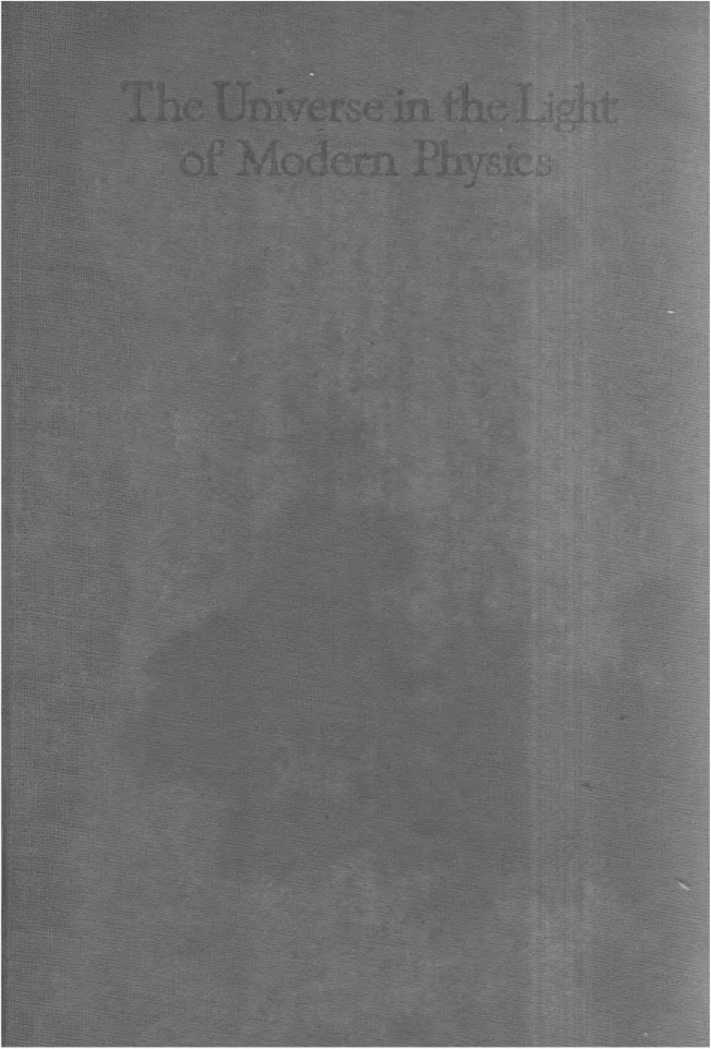THE UNIVERSE IN THE LIGHT OF MODERN PHYSIC
by
DR. MAX PLANCK
Professor of Theoretical Physics at the University of Berlin
Translated by
W. H. JOHNSTON, B. A.
LONDON
GEORGE ALLEN & UNWIN LTD
MUSEUM STREET
]
FIRST PUBLISHED IN ENGLISH 1931
Contents [added by the P2P Editor]
THE UNIVERSE IN THE LIGHT OF MODERN PHYSICS
Physics is an exact Science and hence depends upon measurement, while all measurement itself requires sense-perception. Consequently all the ideas employed in Physics are derived from the world of sense-perception. It follows from this that the laws of Physics ultimately refer to events in the world of the senses; and in view of this fact many scientists and philosophers tend to the belief that at bottom Physics is concerned exclusively with this particular world. What they have in mind, of course, is the world of man's senses. On this view, for example, what is called an Object in ordinary parlance is, when regarded from the standpoint of Physics, simply a combination of different sense-data localized in one place. It is worth pointing out that this view cannot be refuted by logic, since logic itself is unable to lead us beyond the confines of our own senses; it cannot even compel one to admit the independent existence of others outside oneself, [Page 8] In Physics, however, as in every other science, common sense alone is not supreme; there must also be a place for Reason. Further, the mere absence of logical contradiction does not necessarily imply that everything is reasonable. Now reason tells us that if we turn our back upon a so-called object and cease to attend to it, the object still continues to exist. Reason tells us further that both the individual man and mankind as a whole, together with the entire world which we apprehend through our senses, is no more than a tiny fragment in the vastness of Nature, whose laws are in no way affected by any human brain. On the contrary, they existed long before there was any life on earth, and will continue to exist long after the last physicist has perished.
It is considerations of this kind, and not any logical argument, that compel us to assume the existence of another world of reality behind the world of the senses; a world which has existence independent of man, and which can only be perceived indirectly through the medium of the world of the senses, and by means of certain symbols which our senses allow us to apprehend. It is as though we were compelled to contemplate a certain object in which we are interested [Page 9] through spectacles of whose optical properties we were entirely ignorant.
If the reader experiences difficulty in following this argument, and finds himself unable to accept the idea of a real world which at the same time is expressly asserted to lie beyond our senses, we might point out that there is a vast difference between a physical theory complete in every detail, and the construction of such a theory. In the former case the content of the theory can be analysed exactly, so that it is possible to prove at every point that the notions which we apply to the world of sense are adequate to the formulation of this theory; in the latter case we must develop a theory from a number of individual measurements. The second problem is very much more difficult, while the history of Physics shows that whenever it has been solved, this has been done on the assumption of a real world independent of our senses; and it seems reasonably certain that this will continue to be the case in the future.
But besides the world of sense and the real world, there is also a third world which must be carefully distinguished from these:this is the world of Physics. It differs from the two others because it is a deliberate hypothesis put forward [Page 10] by a finite human mind; and as such, it is subject to change and to a kind of evolution. Thus the function of this world of Physics may be described in two ways, according as it is related to the real world, or to the world of the senses. In the first case the problem is to apprehend the real world as completely as possible; in the second, to describe the world of the senses in the simplest possible terms. There is no need, however, to assign superior merit to either of these formulations, since each of them, taken by itself alone, is incomplete and unsatisfactory. On the one hand, the real world cannot be apprehended directly at all; while on the other no definite answer is possible to the question:Which is the simplest description of a given number of interdependent sense-perceptions? In the history of Physics it has happened more than once that, of two descriptions, one was for a time considered the more complicated but was later discovered to be the simpler of the two.
The essential point therefore is that these two formulations of the problem, when practically applied, shall be complementary to each other and not contradictory. The first is an indispensable aid to the groping imagination of the investigator, supplying him with ideas without [Page 11] which his work remains unfruitful; the second provides him with a firm foundation of facts. In actual practice individual physicists are influenced in their investigations by their personal preference for metaphysical, or for positivist, ideas. But besides the metaphysicians and the positivists there is a third group of students who investigate the world from the physical point of view. They differ from the first two groups in being interested not so much in the relation between the world of physics on the one hand, and the real world and the world of sense-data on the other, as in the internal consistency and logical structure of the world of physics. These men form the axiomatic school, whose activity is as necessary and useful as is that of the others. At the same time, they are equally exposed to the danger of specialization which, in their case, would lead to a barren formalism taking the place of a fuller understanding of the world of Physics. For as soon as contact with reality has been lost, physical law ceases to be felt as the relation between a number of magnitudes which have been ascertained independently of one another, and becomes a mere definition by which one of these magnitudes is derived from the others. In this method there is a particular [Page 12] attraction, due to the fact that a physical magnitude can be defined far more exactly by means of an equation than by means of measurement. But at the same time, this method amounts to a renunciation of the true meaning of magnitude; while it must also be remembered that confusion and misunderstanding result when the same name is retained in order to denote a changed meaning.
We see, then, how physicists are at work in different directions and from different standpoints in elaborating a systematic view of the world of Physics. Nevertheless the aim of all these endeavours is the same, and consists in establishing a law which connects the events of the world of sense with one another and with those of the real world. Naturally, these different tendencies predominated in turn at different stages of history. Whenever the physical world presented a stable appearance, as in the second half of the last century, the metaphysical view tended to predominate, and it was believed that a complete grasp of the real world was relatively near. Conversely, in times of change and insecurity like the present, positivism tends to occupy the foreground; for in such times a careful student will tend to seek support where he can find real [Page 13] security; and this is to be found precisely in the events of the world of the senses.


